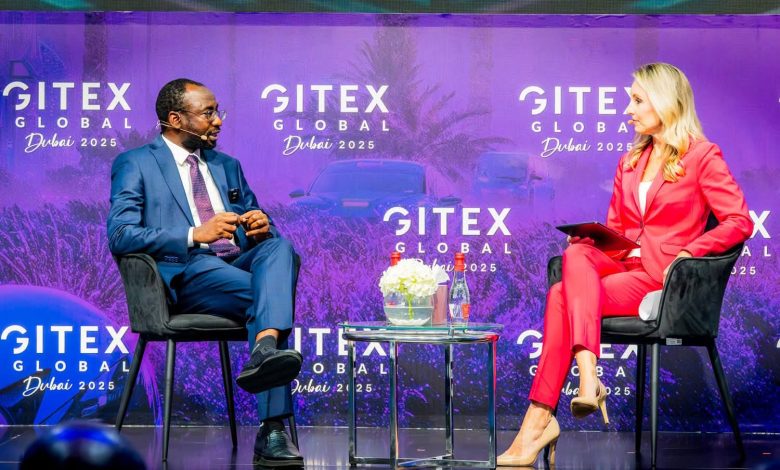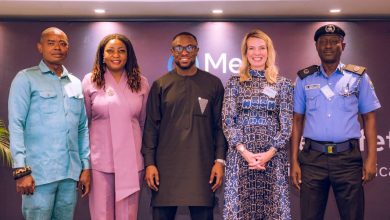
By Juliet Umeh
At this year’s GITEX Global 2025 in Dubai, one of the world’s largest technology exhibitions, Nigeria didn’t just show up; it stood out. With a bold vision for Artificial Intelligence, AI, the country positioned itself as Africa’s emerging AI powerhouse, signaling a shift from digital adoption to digital leadership.
During a Fireside Chat at the AI Stage, Director General of the National Information Technology Development Agency, NITDA, Kashifu Inuwa Abdullahi, CCIE, explained that Nigeria’s journey into AI is both strategic and human-centered.
“AI is not about machines replacing humans; it’s about amplifying human potential,” Inuwa told the global audience. “Our mission is to use AI responsibly to drive prosperity, inclusivity, and sustainable development. We are not catching up, we are building from within.”
Building a smarter Nigeria, powered by local innovation
Inuwa emphasized that Nigeria’s AI strategy is guided by five principles — responsibility, ethics, inclusivity, sustainability, and collaboration — and built around three major objectives: strengthening the ecosystem, accelerating adoption, and ensuring governance and trust.
He highlighted that AI is already transforming critical sectors of Nigeria’s economy. In agriculture, the technology is helping farmers make informed decisions using real-time data on soil quality, weather patterns, and crop health. In healthcare, AI-driven diagnostic tools are enabling faster and more accurate diagnoses while extending quality medical services to rural communities. In the education sector, AI is being integrated into learning systems to ensure that young Nigerians acquire digital skills that will keep them competitive in the global economy. Meanwhile, in the financial sector, AI-powered tools are improving fraud detection, expanding credit access, and promoting financial inclusion for underserved populations.
According to him, AI also presents an opportunity to transform governance by enhancing public service delivery. He explained that Nigeria envisions a future where citizens can apply for passports or business permits in minutes rather than weeks. “AI can make that a reality,” he said. “It has the potential to rebuild trust between government and citizens by making public services faster, smarter, and more transparent.”
Nigeria’s AI ecosystem gains momentum
Inuwa revealed that over 70 percent of Nigeria’s online population already uses generative AI tools, a figure that surpasses the global average of 48 percent. He attributed this rapid adoption to the nation’s youthful population and its strategic investments in digital skills.
He mentioned flagship government initiatives driving this transformation, including the Digital Literacy for All (DL4ALL) programme, which aims to achieve 95 percent digital literacy by 2030, and the 3 Million Technical Talent (3MTT) initiative — one of the world’s most ambitious digital upskilling programs. In addition, a new national policy on digital literacy is integrating technology and AI education across all levels of the school system, ensuring that future generations are not left behind in the AI-driven global economy.
Among the country’s most ambitious projects is the development of M-ATLAS, Nigeria’s first indigenous Large Language Model (LLM). Inuwa explained that with over 500 languages and countless dialects, Nigeria requires a locally developed AI model capable of understanding the nation’s cultural and linguistic diversity. “If we rely only on foreign AI models, they won’t understand our nuances, culture, or people,” he said. “That is why we are building M-ATLAS, an indigenous LLM that reflects our diversity and eliminates bias. We want an AI that understands the meaning of ‘akwa,’ ‘ekaabo,’ or ‘sannu,’ not just translates them.”
From adopters to architects of the AI future
Inuwa also drew inspiration from Africa’s past successes, recalling how the continent leapfrogged the rest of the world in mobile technology adoption. He asserted that Africa could achieve even greater success with AI because this time, the innovation is being built from within rather than imported.
“Africa once leapfrogged the world in mobile technology. Now, we can do the same, and more, with AI,” he declared.
At GITEX 2025, where global technology leaders showcased advancements in quantum computing, AI ethics, and automation, Nigeria’s message resonated strongly. Its strategy-first, people-centered AI roadmap captured attention for promoting responsible innovation that serves both citizens and industries.
With Lagos emerging as the nation’s innovation hub, Abuja serving as the policy nerve center, and a growing network of startups, research labs, and innovators redefining what is possible, Nigeria’s ambition is clear: to lead Africa’s AI transformation through collaboration, innovation, and inclusion.
“We are not just building systems,” Inuwa concluded. “We are shaping a future that works for everyone.”




